"The hammer of the gods will drive our ships to new lands,
to fight the horde, singing and crying: Valhalla, I am coming!" ~Robert Plant
What a better way to end Phyllis's three part series on here than with the final destiny of Odin, Ragnaro, the Wise Woman and the Gods.
Phyllis, we thank you. Her fantastic site can be accessed at http://phyllisdoyle.hubpages.com
to fight the horde, singing and crying: Valhalla, I am coming!" ~Robert Plant
What a better way to end Phyllis's three part series on here than with the final destiny of Odin, Ragnaro, the Wise Woman and the Gods.
Phyllis, we thank you. Her fantastic site can be accessed at http://phyllisdoyle.hubpages.com
Odin - the Wise Woman- Ragnarok - the Final Destiny of the Gods by Phyllis Doyle
Norse mythology-
Odin, father of all gods in Norse mythology, calls upon the Wise Woman, to find out about Ragnarok, the final destiny of the gods in this final battle, there will be the demise of many heroes and gods as foretold in the poem ( The Wise Woman's Prophecy), the most famous of all the poems in the Poetic Edda.
Odin, father of all gods in Norse mythology, calls upon the Wise Woman, to find out about Ragnarok, the final destiny of the gods in this final battle, there will be the demise of many heroes and gods as foretold in the poem ( The Wise Woman's Prophecy), the most famous of all the poems in the Poetic Edda.
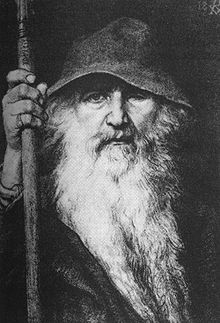 Odin the Wanderer (1896) by Georg von Rosen Source: Wikipedia Public Domain - Odin
Odin the Wanderer (1896) by Georg von Rosen Source: Wikipedia Public Domain - Odin The Poetic Edda, often referred to as the Elder Edda, is the most important extant source of Norse mythology. It is a collection of ancient Old Norse poems contained in the Codex Regius, an Icelandic manuscript which was written int eh 1270's. Many of the stanzas of the Voluspa are also in the Prose Edda of the 13th century, by the Icelandic historian and poet Snorri Sturluson.
Odin, the Allfather
Odin is the powerful god of the EEsir (Nose pantheon), the father of all gods, in the Voluspa Odin visits a volva,m a shamanic seeress adept in sorcery and prophecy. A volva was highly esteemed and possessed power that surpassed even those of Odin.
Odin wishes to gain the Widsom of the Ages with the help of the Volva, whom he bids to rise from her grave. He is always very aware of impending disasters and continually seeks more knowledge. He calls upon the Volva and she demands a hearing wherein she relates all of the past from Creation forward. All the stanzas herein of the poem come from Volumn 1 of The Poetic Edds, Lays of the Gods, Voluspa.
Odin, the Allfather
Odin is the powerful god of the EEsir (Nose pantheon), the father of all gods, in the Voluspa Odin visits a volva,m a shamanic seeress adept in sorcery and prophecy. A volva was highly esteemed and possessed power that surpassed even those of Odin.
Odin wishes to gain the Widsom of the Ages with the help of the Volva, whom he bids to rise from her grave. He is always very aware of impending disasters and continually seeks more knowledge. He calls upon the Volva and she demands a hearing wherein she relates all of the past from Creation forward. All the stanzas herein of the poem come from Volumn 1 of The Poetic Edds, Lays of the Gods, Voluspa.
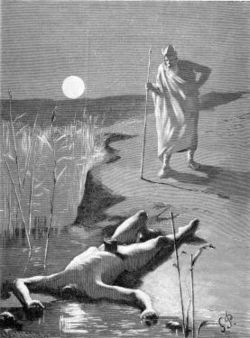 Odin the Wanderer (1896) by Georg von Rosen Source: Wikipedia Public Domain - Odin
Odin the Wanderer (1896) by Georg von Rosen Source: Wikipedia Public Domain - Odin The first disaster for the gods-
Before going further, the Volva recalls the death of Baldr.
The first great disaster to the gods defines Loki as an enemy and outcast of the gods in AEsir. This disaster was the death of Baldr, the son of Odin and Frigg. Baldr was the god of light, The Shining One. He had a dream of his own death by an arrow and sought Frigg to tell her. She had the same dream on same night. She loved Baldr beyond all, so called upon all the trees and plants of the woods. She made them swear that no part of them would ever harm Baldr. All the plants made an oath to her, all except the mistletoe. Frigg thought the mistletoe too yundgand fragile to swear an oath.
It had become a great game for the young gods to shoot arrows at Baddr and watch them bounce off, not harming him. Loki, the troublemaker, found out about the mistletoe and made an arrow from it He gave the arrow to Hoth, the blind younger brother of Baldr. Happy to be a part ot the game, Hoth hurled the arrow which struck and killed Baldr.
the Volva relates this event to Odin
32. I saw for Baldr, the bleeding god,
The Son of Othin, his destiny set
Famous and fair in the lofty fields,
Full grown in strength the mistletoe stood.
Another of Odin's Vali, slew Hoth. Great was the sorrow of Odin and Frigg. The gods then took Loki and bound him to a tree with a serpent fastened to the tree just above Loki's head. Venom of the serpent constantly dripped down. Loki's wife, Sigyn, stays beside him with a bowl to catch the venom. When the bowl is full, she has to leave to empty it and the venom drips over Loki's face. Earth shook from the struggles of Loki.
Before going further, the Volva recalls the death of Baldr.
The first great disaster to the gods defines Loki as an enemy and outcast of the gods in AEsir. This disaster was the death of Baldr, the son of Odin and Frigg. Baldr was the god of light, The Shining One. He had a dream of his own death by an arrow and sought Frigg to tell her. She had the same dream on same night. She loved Baldr beyond all, so called upon all the trees and plants of the woods. She made them swear that no part of them would ever harm Baldr. All the plants made an oath to her, all except the mistletoe. Frigg thought the mistletoe too yundgand fragile to swear an oath.
It had become a great game for the young gods to shoot arrows at Baddr and watch them bounce off, not harming him. Loki, the troublemaker, found out about the mistletoe and made an arrow from it He gave the arrow to Hoth, the blind younger brother of Baldr. Happy to be a part ot the game, Hoth hurled the arrow which struck and killed Baldr.
the Volva relates this event to Odin
32. I saw for Baldr, the bleeding god,
The Son of Othin, his destiny set
Famous and fair in the lofty fields,
Full grown in strength the mistletoe stood.
Another of Odin's Vali, slew Hoth. Great was the sorrow of Odin and Frigg. The gods then took Loki and bound him to a tree with a serpent fastened to the tree just above Loki's head. Venom of the serpent constantly dripped down. Loki's wife, Sigyn, stays beside him with a bowl to catch the venom. When the bowl is full, she has to leave to empty it and the venom drips over Loki's face. Earth shook from the struggles of Loki.
The Volva
The Volva was once called Gullveig by all who knew her. It is uncertain if Gullveig was a goddess or a sorceress. The AEsir had executed her by spearing then burning her. Three times they did this and three times she came back. After the third time she was called by the name Heior, meaning "fame" in Old Norse.
Several scholars have proposed that Gullveig may have been the goddess Freyja. If she had been Freyja, it could have been the cause, or at least one, of the AEsir-Vanir War, the first war of the world. Freyja was a member of the Vanir. As a VAnir goddess, she was adept in witchcraft. Her husband was Oor, a member of the AEsir. Oor often went on long journeys, leaving Freyja alone. She traveled in disguise under many different names searching for Oor. The Vanir would have been furious if Freyja was in face Gullveig, executed by the AEsir, and would have sought revenge.
The Volva was once called Gullveig by all who knew her. It is uncertain if Gullveig was a goddess or a sorceress. The AEsir had executed her by spearing then burning her. Three times they did this and three times she came back. After the third time she was called by the name Heior, meaning "fame" in Old Norse.
Several scholars have proposed that Gullveig may have been the goddess Freyja. If she had been Freyja, it could have been the cause, or at least one, of the AEsir-Vanir War, the first war of the world. Freyja was a member of the Vanir. As a VAnir goddess, she was adept in witchcraft. Her husband was Oor, a member of the AEsir. Oor often went on long journeys, leaving Freyja alone. She traveled in disguise under many different names searching for Oor. The Vanir would have been furious if Freyja was in face Gullveig, executed by the AEsir, and would have sought revenge.
1. Hearing I ask from the holy races,
From Heimdall's sons, both high and low,
Thou wild, Valfather, that well I relate
Old tales I remember of men long ago.
2. I remember yet the giants of yore,
Who gave me bread in the days gone by,
Nine worlds I knew, the nine in the tree
With mightly roots beneath the mold
Heimdall is the watchman of the gods. His sons (brethren of kin) both high and low are the gods and mankind in general. She refers to Odin as "Valfather", because all the brave and good stain warriors in battles are brought to him in Valhalla (Hall of the Stain) where they are given immortality till they are to fight in Ragnarok. The nine worlds of the tree are the non worlds (levels) of the gods in Yggdrasil, the World Tree. It s roots reach far down in Earth and its branches reach to Heaven. Its arms spread out over all the world.
From Heimdall's sons, both high and low,
Thou wild, Valfather, that well I relate
Old tales I remember of men long ago.
2. I remember yet the giants of yore,
Who gave me bread in the days gone by,
Nine worlds I knew, the nine in the tree
With mightly roots beneath the mold
Heimdall is the watchman of the gods. His sons (brethren of kin) both high and low are the gods and mankind in general. She refers to Odin as "Valfather", because all the brave and good stain warriors in battles are brought to him in Valhalla (Hall of the Stain) where they are given immortality till they are to fight in Ragnarok. The nine worlds of the tree are the non worlds (levels) of the gods in Yggdrasil, the World Tree. It s roots reach far down in Earth and its branches reach to Heaven. Its arms spread out over all the world.
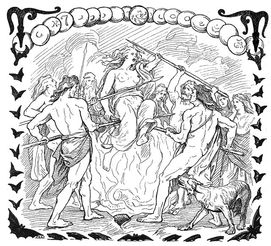 The Æsir lift Gullveig on spears over fire as illustrated by Lorenz Frølich (1895)
The Æsir lift Gullveig on spears over fire as illustrated by Lorenz Frølich (1895) The Volva recounts events far into the past, including things only Odin knows, and far into the future she tell fo things Odin wishes to know.
The Voluspa
When Odin first begins talking with the Volva, there is a formality wherein they each must test each other. She must present proof of the abilities as a Wise Woman and seeress. Odin muse therefore listen to her tales of the past and acknowledge her wisdom as truth. The Volva tell Odin she know where the horn of Heimdall, watchman of the gods, is hidden under Yggdrasil. This is the horn that Heimdall will blow to summon the gods to counsel before the final battle.
27. I know of the horn of Heimdall, hidden
Under the high-reaching holy tree;
On it there pours from Valfather's pledge
A mighty stream would you know yet more?
The Volva changes directions here and addresses Odin directly. Although Odin has not told her why he called her up, she knows what he wants and how much he has endured in his constanbt search for knowledge of his own doom, in an earlier journey for knowledge. Odin had gone to the well of Mimir, The Well of Wisdom. The well was named after Mimir, a man who had counseled other wisely. Mimir asked for sacrifice if Odin wanted to see future events. He told Odin that if he wanted to be a seer he must put one of his eyes in the well, so Odin sacrificed one eye. He also pledged to bring mead to Mimir each morn for more knowledge.
Mimir had been a counselor to Hoenir, a chieftain the gods thought was very wise. When the gods found out that it was Mimir who gave the the wisdom to Hoenir, they beheaded Mimir and sent the head to Odin in Asgard. Odin embalmed the head and spoke charms over it so the head could counsel Odin the secrets and many things. Odin carried the head with him everywhere. The body of Mimir had been thrown in a well where Odin found it.
The Voluspa
When Odin first begins talking with the Volva, there is a formality wherein they each must test each other. She must present proof of the abilities as a Wise Woman and seeress. Odin muse therefore listen to her tales of the past and acknowledge her wisdom as truth. The Volva tell Odin she know where the horn of Heimdall, watchman of the gods, is hidden under Yggdrasil. This is the horn that Heimdall will blow to summon the gods to counsel before the final battle.
27. I know of the horn of Heimdall, hidden
Under the high-reaching holy tree;
On it there pours from Valfather's pledge
A mighty stream would you know yet more?
The Volva changes directions here and addresses Odin directly. Although Odin has not told her why he called her up, she knows what he wants and how much he has endured in his constanbt search for knowledge of his own doom, in an earlier journey for knowledge. Odin had gone to the well of Mimir, The Well of Wisdom. The well was named after Mimir, a man who had counseled other wisely. Mimir asked for sacrifice if Odin wanted to see future events. He told Odin that if he wanted to be a seer he must put one of his eyes in the well, so Odin sacrificed one eye. He also pledged to bring mead to Mimir each morn for more knowledge.
Mimir had been a counselor to Hoenir, a chieftain the gods thought was very wise. When the gods found out that it was Mimir who gave the the wisdom to Hoenir, they beheaded Mimir and sent the head to Odin in Asgard. Odin embalmed the head and spoke charms over it so the head could counsel Odin the secrets and many things. Odin carried the head with him everywhere. The body of Mimir had been thrown in a well where Odin found it.
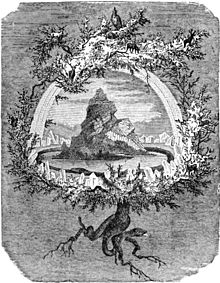 The Ash Yggdrasil, by Wilhelm Wagner, 1896 - Source: Wikipedia Public Domain - Yggdrasil
The Ash Yggdrasil, by Wilhelm Wagner, 1896 - Source: Wikipedia Public Domain - Yggdrasil The Volva asks Odin (the Old One) , "What questions do you have? Why have you come here? She proceeds to tell Odin she knows where his eye is.
28. Alone I sat when the Old One sought me,
The terror of gods, and gazed in mine eyes:
"What hast thou to ask? why com est thou hither?
Odin, I know where thine eye is hidden."
29. I know where Odin's eye is hidden,
Deep in the wide-famed well of Mimir,
Mead from the pledge of Odin each mom
Does Mirmir drink: would you know yet more?
30. Necklaces had I and rings from Heerfather,
Wise was my speech and my magic wisdom,
Widely I saw over all the worlds.
When she asks, "would you know yet more?" she is relating to Odin that she has proved her knowledge of the past and of the secrets he holds. Odin in turn acknowledges her wisdom and had rewarded her with jewelry, which is an indication to tell him more. She refers to Odin as "Heerfather" (father of the Host). Line 30 brings Odin and the Volva to the point where they both accept that the past she relates to is true and she will now transition to the future and the real reason Odin has come to here.
28. Alone I sat when the Old One sought me,
The terror of gods, and gazed in mine eyes:
"What hast thou to ask? why com est thou hither?
Odin, I know where thine eye is hidden."
29. I know where Odin's eye is hidden,
Deep in the wide-famed well of Mimir,
Mead from the pledge of Odin each mom
Does Mirmir drink: would you know yet more?
30. Necklaces had I and rings from Heerfather,
Wise was my speech and my magic wisdom,
Widely I saw over all the worlds.
When she asks, "would you know yet more?" she is relating to Odin that she has proved her knowledge of the past and of the secrets he holds. Odin in turn acknowledges her wisdom and had rewarded her with jewelry, which is an indication to tell him more. She refers to Odin as "Heerfather" (father of the Host). Line 30 brings Odin and the Volva to the point where they both accept that the past she relates to is true and she will now transition to the future and the real reason Odin has come to here.
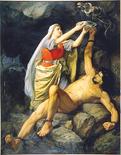 Loki and Sigyn (1863) by Mårten Eskil Winge Source: Wikipedia Public Domain - Loki
Loki and Sigyn (1863) by Mårten Eskil Winge Source: Wikipedia Public Domain - Loki In the Prose Edda, Loki is introduced formally in chapter 34 of the book Gylfaginning. He is referred to as the "originator of deceits" and " the disgrace of all gods and men". Odin and Loki had once been friends and there was a time when Odin said he would not drink mead unless Loki was with him. All the deceits of Lori, all the sorrow he caused had broken the friendship.
Future destiny of the gods-
Then the Volva comes to the heart of the knowledge Odin seeks: the events of the future where he asks her many questions. Among many other things, the Volva sees the final destiny of the gods and Odin's doom during Ragnarok.
The seeress tells Odin of how floods will overwhelm Earth and fires so fierce the flames will leap as high as Heaven while the gods fight to their death with their enemies. She says the Valkyries will bring the slain warriors in AEsir of all past battles to aid Odin and other gods.
Then the Volva comes to the heart of the knowledge Odin seeks: the events of the future where he asks her many questions. Among many other things, the Volva sees the final destiny of the gods and Odin's doom during Ragnarok.
The seeress tells Odin of how floods will overwhelm Earth and fires so fierce the flames will leap as high as Heaven while the gods fight to their death with their enemies. She says the Valkyries will bring the slain warriors in AEsir of all past battles to aid Odin and other gods.
Loki, now free of his bindings, will lead the evil gods and the wicked slain ones from Hell's domain.
Will there be survivors?
Odin asks if there will be any survivors of Ragnarok and will Earth itself survive. She says there will be two survivors, Lif and Liftharasir, who will survive by living in a cave and eventually they will repopulate Earth.
The Volva sees Earth rising again, in all its glory. What was beautiful before will be even more so. Fields that once were barren and unsewn will bear fruit. Lush areas of green will spawn new growth and the seas will be abundant with fish and all manner of sea life.
59. Now do I see the earth anew
Rise all green from the waves again,
The cataracts fall, and the eagle flies,
And fish he catches beneath the cliffs.
Odin asks if there will be any survivors of Ragnarok and will Earth itself survive. She says there will be two survivors, Lif and Liftharasir, who will survive by living in a cave and eventually they will repopulate Earth.
The Volva sees Earth rising again, in all its glory. What was beautiful before will be even more so. Fields that once were barren and unsewn will bear fruit. Lush areas of green will spawn new growth and the seas will be abundant with fish and all manner of sea life.
59. Now do I see the earth anew
Rise all green from the waves again,
The cataracts fall, and the eagle flies,
And fish he catches beneath the cliffs.
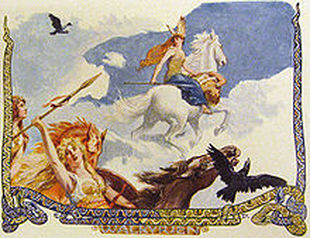 Walkyrien (c. 1905) by Emil Doepler Source: Wikipedia Public Domain - Valkyries
Walkyrien (c. 1905) by Emil Doepler Source: Wikipedia Public Domain - Valkyries How fare the gods?
Odin asks "How fare the gods?" Some of the AEsir, gods, will return and tell of the deeds of Odin, his sons and others who fought bravely and honorably. They will tell how the fires destroyed Earth and how she was claimed by the sea. Baldr, Odin's beloved son who was slain long before Ragnarok because of the deceitful god Loki, will return.
Ragnarok-
In stanzas 40 through 42, the Volva foretells how the freat battle begins.
40. The giantess old in Ironwood sat,
In the east, and bore the brood of Fenrir:
Among these one in monster's guise
Was soon to steal the sun from the sky.
41. There he feeds full on the flesh of the dead,
And the home of the gods he reddens with gore,m
Dark grows the sun, and in summer soon
Come mighty storms: would you know yet more?
42. On al hill there sat,m and smote on his harp,
Eggther the joyous, the giants' warder:
Above him the cock in the bird-wood crowned,
Fair and red did Fjalar stand.
The giantess was married to Fenrir, a wold. The brood of Fenrir are their sons, the wolves
Skoll and Hati. Skoll steals the sun and Hati steals the moon. Eggther is the watchmnan of the giants. Fjalar is the cock whose crowing screech awakens the giants for the battle, Gollinkambi is the cock who awakens the gods of AEsir.
43. Then to the gods crowed Gollinkambi,
He wakes the heroes in Othin's hall,
And beneath the earth does another crow,
The rust-red bird ath the bars of Hel.
44. Now Garm howls loud before Gripahellir,
The fetters will burst, and the wolf run free,
Much do I know, and more can see
Of the fate of the gods, the might in light.
Gripahellir is the entrance to Hel's world of the dead. Garm is the dog, in some stanzas referred to as a wold, thatr guards the gate of Hel.
45 -Brothers shall fight and fell each other,
And sister's sons shall kinship stain,
Hard is it on earth, with mighty wwhoredom,
Axe-time, sword-time, shields are sundered,
Wind-time, wolf-time, ere the world falls,
Nor ever shall men each other spare.
The Volva tells of how brothers will turn against each other and how nephews (sisters sons) will turn against their uncles (kindship). The relationship between men and their nephews was often closer than fathers and sons.
46. Fast move the sons of Mirn, and fate
Is heard in the note of the Gjallarhom,
Loud blows Heimdall, the horn is alot,
In fear quake all who on Hel-roads are.
The sons of Mirn are spirits of the water. Mirm was the one who asked Odin for his eye at Mimer's well. Gjallarhorn the horn shrieks as Hiemdall blows it hard with all his mnight, rendering fear in the warriors of Hel.
47. Yggdrasil shakes, and shiver on high
The ancient limbs, and the giant is loose,
To the head of Mirn does Othin give heed,
But the kinsman of Surt shall slay him soon.
Odin leads the gods of AEsir to the battle, Loki, now free of his bindings, leads the evil ones. Just as the most brave and good of the slain warriors were taken to Odin for the final battle, the most evil were taken to the goddess Hel to aid in the battle against Odin. Hel had sent the evil ones to Loki.
Odin asks "How fare the gods?" Some of the AEsir, gods, will return and tell of the deeds of Odin, his sons and others who fought bravely and honorably. They will tell how the fires destroyed Earth and how she was claimed by the sea. Baldr, Odin's beloved son who was slain long before Ragnarok because of the deceitful god Loki, will return.
Ragnarok-
In stanzas 40 through 42, the Volva foretells how the freat battle begins.
40. The giantess old in Ironwood sat,
In the east, and bore the brood of Fenrir:
Among these one in monster's guise
Was soon to steal the sun from the sky.
41. There he feeds full on the flesh of the dead,
And the home of the gods he reddens with gore,m
Dark grows the sun, and in summer soon
Come mighty storms: would you know yet more?
42. On al hill there sat,m and smote on his harp,
Eggther the joyous, the giants' warder:
Above him the cock in the bird-wood crowned,
Fair and red did Fjalar stand.
The giantess was married to Fenrir, a wold. The brood of Fenrir are their sons, the wolves
Skoll and Hati. Skoll steals the sun and Hati steals the moon. Eggther is the watchmnan of the giants. Fjalar is the cock whose crowing screech awakens the giants for the battle, Gollinkambi is the cock who awakens the gods of AEsir.
43. Then to the gods crowed Gollinkambi,
He wakes the heroes in Othin's hall,
And beneath the earth does another crow,
The rust-red bird ath the bars of Hel.
44. Now Garm howls loud before Gripahellir,
The fetters will burst, and the wolf run free,
Much do I know, and more can see
Of the fate of the gods, the might in light.
Gripahellir is the entrance to Hel's world of the dead. Garm is the dog, in some stanzas referred to as a wold, thatr guards the gate of Hel.
45 -Brothers shall fight and fell each other,
And sister's sons shall kinship stain,
Hard is it on earth, with mighty wwhoredom,
Axe-time, sword-time, shields are sundered,
Wind-time, wolf-time, ere the world falls,
Nor ever shall men each other spare.
The Volva tells of how brothers will turn against each other and how nephews (sisters sons) will turn against their uncles (kindship). The relationship between men and their nephews was often closer than fathers and sons.
46. Fast move the sons of Mirn, and fate
Is heard in the note of the Gjallarhom,
Loud blows Heimdall, the horn is alot,
In fear quake all who on Hel-roads are.
The sons of Mirn are spirits of the water. Mirm was the one who asked Odin for his eye at Mimer's well. Gjallarhorn the horn shrieks as Hiemdall blows it hard with all his mnight, rendering fear in the warriors of Hel.
47. Yggdrasil shakes, and shiver on high
The ancient limbs, and the giant is loose,
To the head of Mirn does Othin give heed,
But the kinsman of Surt shall slay him soon.
Odin leads the gods of AEsir to the battle, Loki, now free of his bindings, leads the evil ones. Just as the most brave and good of the slain warriors were taken to Odin for the final battle, the most evil were taken to the goddess Hel to aid in the battle against Odin. Hel had sent the evil ones to Loki.
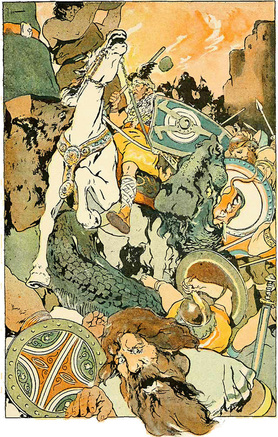 Then the Awful Fight Began by George Wright, 1908 - Source: Wikipedia Public Domain -
Then the Awful Fight Began by George Wright, 1908 - Source: Wikipedia Public Domain - The mighty gods fight against the enemy, the creatures of the evil, like the giant serpent, and those gods who lead the evil ones. Many die as the venomous serpent twists and turns in his wrath. The tawny eagle, as it gnaws on the dead screams. Thor, Odin's powerful son and second in command, advances and strikes a death blow to the serpent. The venom from the serpent suffocates Thor, he staggers nine paces then falls dead.
Garm the wolf who guards Griiipahellir, at the gates of Hel breaks free of his chains and Odin fights him. The battle is fierce, the Allfather strong and might, but Garm and slays Odin.
Sigfather is Odin. Vithar is Odin's son who fights the wolf. The Garm is a son of a great Vithar thrust his sword deep in the heart of the wolf and kills him, thereby aventging his father'd death.
52. Surt fares from the south with the scourge of branches,
The sun of the battle-gods shone from his sword,
The crags are sundered, the giant-women sink.,
The dead throng Hel-way, and heaven is cloven.
Surt is the ruler of the fire-world. He came from the sough with branches of fire, the sun shining brightly off his sword.
53. Now comes to Hlin yet another hurt,
When Othin fares to fight with the wolf,
And Beli's fair slayer seeks out Surt,
For there must fall the joy of Frigg.
In horror Frigg (Hlin) had watched the death of Odin, her love, her joy. With the loss of Baldr and now Odin, she is alone in deep sorrow. Beli's fair slayer if the god Freyr, brother of Freyja. He had killed the giant Beli with just his fist.
Vithar, Odin's son avenges his father's death, as the Volva relates:
54. Then comes Sigfather's mighty son,
Vithar, to fight with the foaming wolf,
In the giant's son does he thrust his sword,
Full to the heart: his father is avenged.
Garm the wolf who guards Griiipahellir, at the gates of Hel breaks free of his chains and Odin fights him. The battle is fierce, the Allfather strong and might, but Garm and slays Odin.
Sigfather is Odin. Vithar is Odin's son who fights the wolf. The Garm is a son of a great Vithar thrust his sword deep in the heart of the wolf and kills him, thereby aventging his father'd death.
52. Surt fares from the south with the scourge of branches,
The sun of the battle-gods shone from his sword,
The crags are sundered, the giant-women sink.,
The dead throng Hel-way, and heaven is cloven.
Surt is the ruler of the fire-world. He came from the sough with branches of fire, the sun shining brightly off his sword.
53. Now comes to Hlin yet another hurt,
When Othin fares to fight with the wolf,
And Beli's fair slayer seeks out Surt,
For there must fall the joy of Frigg.
In horror Frigg (Hlin) had watched the death of Odin, her love, her joy. With the loss of Baldr and now Odin, she is alone in deep sorrow. Beli's fair slayer if the god Freyr, brother of Freyja. He had killed the giant Beli with just his fist.
Vithar, Odin's son avenges his father's death, as the Volva relates:
54. Then comes Sigfather's mighty son,
Vithar, to fight with the foaming wolf,
In the giant's son does he thrust his sword,
Full to the heart: his father is avenged.
The battle rages in fury never before seen and the mighty will fall. Fire will engulf Earth and black will be the day from its smoke.
57. The sun turns black, Earth sinks in the sea,
The hot stars down from heaven are whirled;
Fierce grows the steam and the life-feeding flame,
Till fire leaps high about heaven itself.
With stanza 57, we have the account of the horrible destruction of mighty gods and Earth. In the rest of the stanzas she speaks of the new world and those who inhabit it.
The New World-
57. The sun turns black, Earth sinks in the sea,
The hot stars down from heaven are whirled;
Fierce grows the steam and the life-feeding flame,
Till fire leaps high about heaven itself.
With stanza 57, we have the account of the horrible destruction of mighty gods and Earth. In the rest of the stanzas she speaks of the new world and those who inhabit it.
The New World-

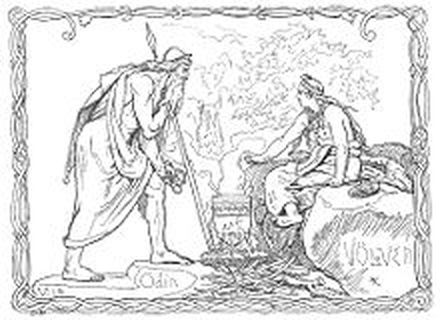
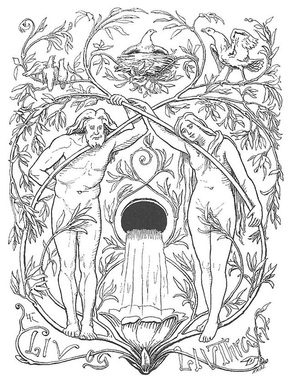
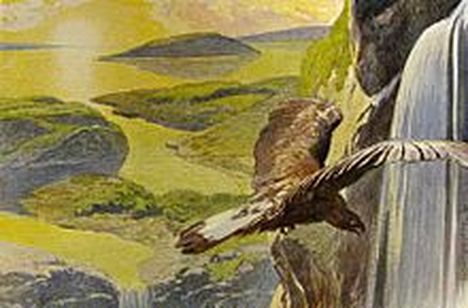

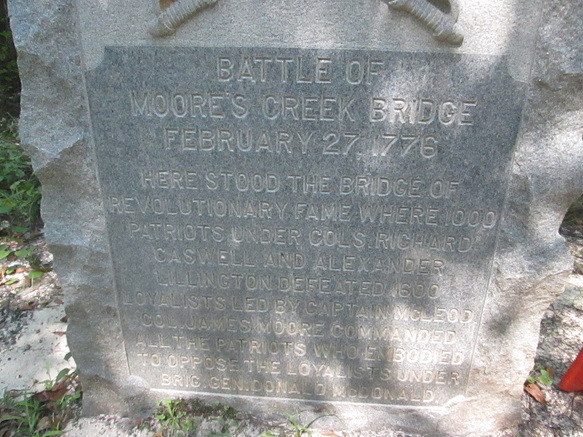
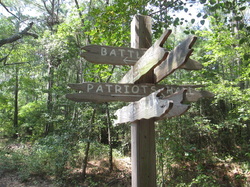
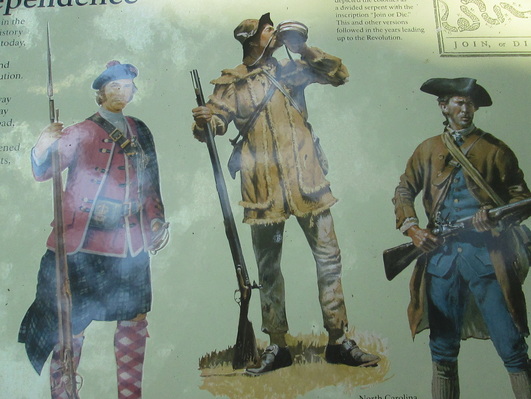
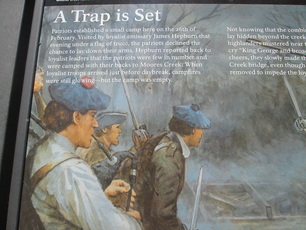
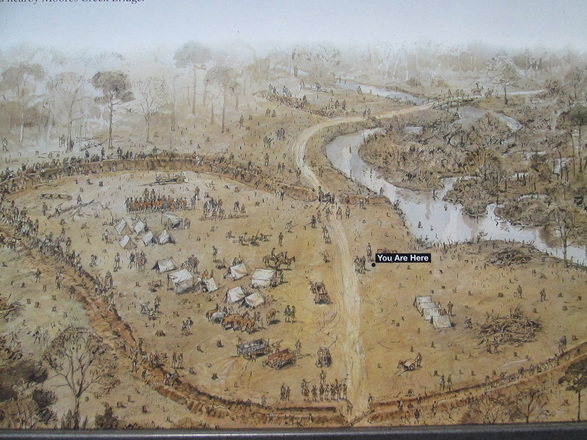
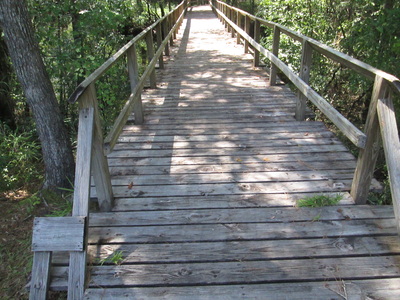
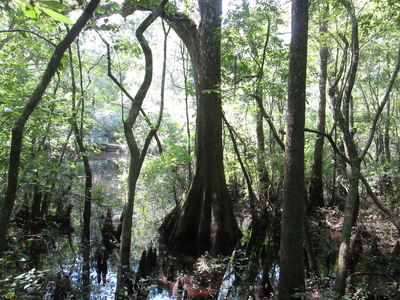
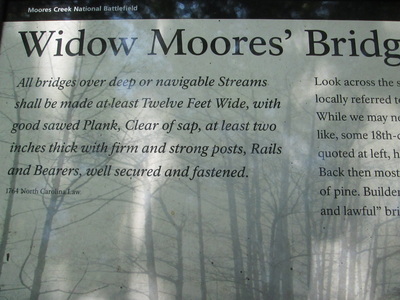
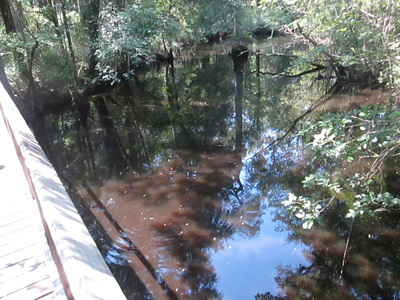
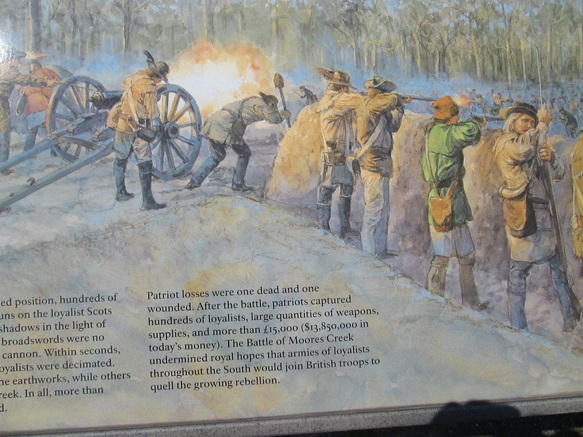
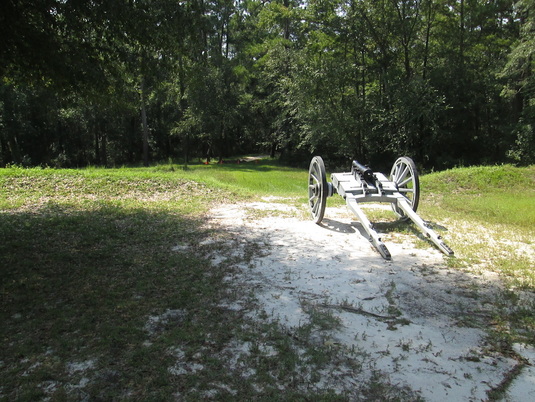
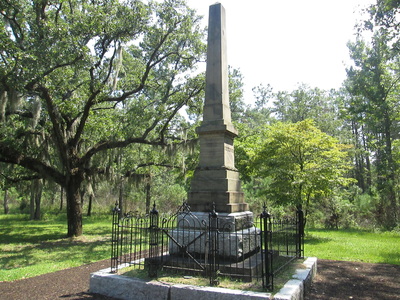
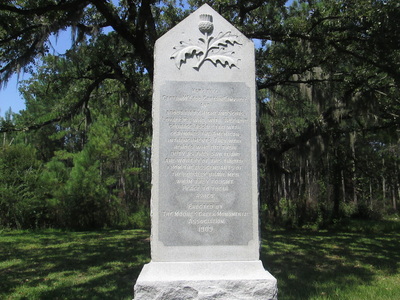
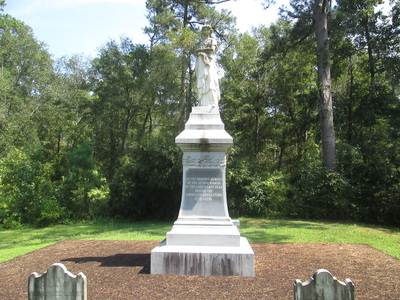
 RSS Feed
RSS Feed
